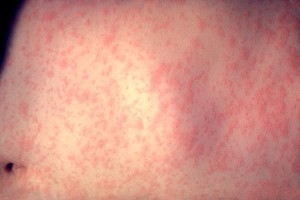NewsDesk @bactiman63
UK health officials issued a dire warning for London today: UK Health Security Agency (UKHSA) modelling suggests that, unless MMR vaccination rates improve, London could see a measles outbreak with tens of thousands of cases.

Current MMR vaccine coverage in the routine childhood programme is the lowest it has been in a decade with about 10% of children not protected from measles by the time they are ready to start school.
The risk in London is primarily due to low vaccination rates over several years, further impacted by the COVID-19 pandemic, particularly in some areas and groups where coverage of the first MMR dose at 2 years of age is as low as 69.5%.
According to the risk assessment, levels of measles susceptibility are likely to exceed the threshold for optimal disease control in the teenage and young adult cohorts across the country, although it is more challenging to assess coverage in this age group as accuracy of vaccine records declines with age. With current levels of coverage, a measles outbreak of between 40,000 and 160,000 cases could occur in London. Hospitalization rates vary by age but range from 20 to 40%. These estimates are subject to certain limitations, but most of the uncertainty relates to data inputs (ascertainment of coverage) rather than issues with the underlying model. Data in younger age groups (closer to the offer of vaccination) is more reliable and suggests coverage is well below the threshold needed for optimal disease control in London.
Data published today by the UK Health Security Agency (UKHSA) shows there has been a steady rise in measles cases this year.

Image/CDC
Between 1 January and 30 June this year there have been 128 cases of measles, compared to 54 cases in the whole of 2022, with 66 per cent of the cases detected in London although cases have been seen in all regions.
How contagious is measles? Answer: Very
Measles is highly infectious – the most infectious of all diseases transmitted through the respiratory route. In a population with no immunity to measles (a totally susceptible population) a single case of measles will infect between 10 and 20 others – this is known as the basic reproduction number (R0). Previous measles infection and vaccination with a measles containing vaccine, however, induces long term immunity and thereby provides protection to that individual and reduces transmission to others. This ‘herd immunity’ is particularly important for diseases of high infectivity, like measles, and for this reason, measles is a regional target for elimination and ultimately for eradication.
Parents should check their children are fully vaccinated with 2 MMR doses, which gives 99% life-long protection, by checking their red book or with their GP practice, which younger and older adults can also do. Anyone not up-to-date should make an appointment as soon as possible.
Measles usually starts with cold-like symptoms followed by a rash. Find out more about the symptoms here 👇https://t.co/QswFrSqi5F https://t.co/W8sQ00hx0s pic.twitter.com/f7lHX0WlGk
— UK Health Security Agency (@UKHSA) July 14, 2023
Dr Vanessa Saliba, UKHSA Consultant Epidemiologist said:
Measles can be a serious infection that can lead to complications especially in young children and those with weakened immune systems. Due to longstanding sub-optimal vaccine uptake there is now a very real risk of seeing big outbreaks in London.
Measles spreads very easily but is preventable. To help protect ourselves, our families and those around us it is vital we all ensure we are vaccinated with 2 doses of the MMR vaccine, free on the NHS whatever your age. Parents can check their children’s red book to see if they are up to date or if you’re not sure anyone can call their GP practice. It’s important everyone is fully vaccinated before travelling overseas this summer.
Nobody wants to see their child or loved ones sick with measles, or put others who are more vulnerable, like babies, at risk. I urge those who have missed their MMR vaccines to catch-up now.

